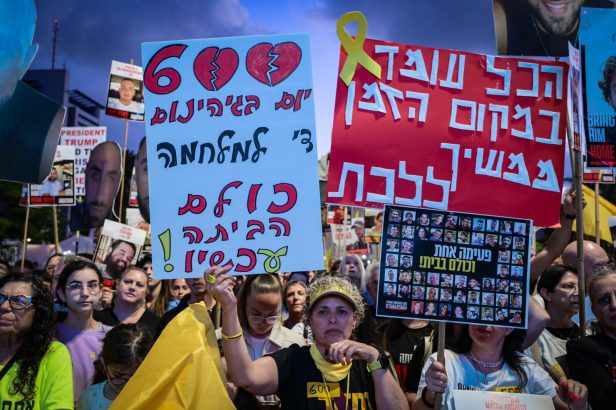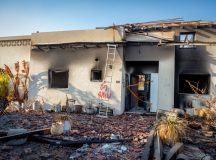I’m writing this on the 600th day of this war. 600 days since Israel was forever changed; permanently scarred by the unimaginable horrors of 7 October 2023.
I don’t remember how early into the war my mind turned to Hayim Nachman Bialik’s In the City of Slaughter, the most influential secular Jewish poem in history. It was certainly in the first week. The poem was written in the wake of the Kishinev pogrom of 1903 and witheringly describes ‘concealed and cowering’ Jews, watching their wives being raped.
‘The daughter in the presence of her mother,
The mother in the presence of her daughter,
Before slaughter, during slaughter and after slaughter!’
The poem long stood as a clarion call for Jewish independence, for Jewish self-defence, for a Jewish army. For Israelis, 7 October was not just an act of terror on an unprecedented scale; it was the devastation of a 77-year national idea: pogroms do not happen to the Jews anymore, not here, not in our own country.
The trauma inflicted on Israelis’ sense of security by the events of that day cannot be overstated. Though no one, of whatever political stripe, saw Hamas as anything other than an implacable enemy of Israel, with an expressly genocidal ideology, most had bought into the same ‘conseptzia’ as the country’s leaders: the disastrously mistaken assumption that governing Gaza had made Hamas into a more pragmatic force; that they would not risk their control of the territory by launching anything more serious than periodic rocket attacks. But no less shocking than the ISIS-style brutality of Hamas’s actions was the realisation that Israel’s government and security forces were completely unprepared. (Netanyahu also had his own, criminally stupid conseptzia: that propping up Hamas with Qatari money was beneficial for Israel as it prevented reconciliation between Gaza and the West Bank.)
In the immediate aftermath of 7 October, the comparison with 9/11 was often made by foreign journalists. But the vast majority of Americans did not know any of the 2,976 victims of Al Qaeda. Neither did they know anyone connected to any of the victims. Almost every Israeli at least knows someone who knows someone who was murdered or taken hostage on that day.
In order to understand the sequence of events that has occurred in Israel and Gaza since 10/7, it is necessary to grasp these components of the Israeli mindset. A great deal of the coverage of the war internationally has completely failed to do that.
I immigrated to Israel at the age of 29. I did not grow up here, go to school here, or serve in the army. Compared to most Israelis, I am unusually socially disconnected. Yet even my social circle was affected by October 7. A friend’s son was murdered in Kibbutz Holit. Hayim Katzman was a longtime peace activist who died protecting his neighbour. Another friend lost his sister that day. She was killed with her husband, both shot lying on their bed. The terrorists didn’t know that one of their three children was being hidden by his parents, lying underneath them as they were riddled with bullets. He lay under his dead parents for several hours, too terrified to move, until the IDF arrived.
Pictures of the hostages are everywhere in Israel. They will greet you at Ben Gurion Airport as you make your way to passport control. They are on every bus stop, and on multiple walls and shop windows in every part of the country. Walking the streets of Israel, you will see people wearing the yellow pin that has become a symbol of the plight of the hostages. This issue, more than any other, has kept Israelis feeling that ‘today is still 7 October’ – a phrase heard regularly, 600 days later.
And then there are the Israeli soldiers. For so many outside Israel who see the terrible destruction in Gaza on the news every night, the Israel Defense Forces are targets for vilification. For the vast majority of Israelis, they are heroes. Israelis have got used to waking up to a 6 am announcement on the news, naming the soldiers who fell the previous day. Over 900 in total since the war began, and almost every family in Israel has had a father or son – or both – serving.
For so much of the world, this war has been about Israel’s supposed wildly disproportionate response to Hamas’ atrocity. For Israelis, it has been about finding a way to end – finally – the existential threat from the Iranian-led ‘axis of resistance.’ And this is not hyperbole. As The New York Times reported, recovered minutes of Hamas meetings reveal that Hamas’s plan had been for Hezbollah and Iran to follow it in launching a full-scale assault on Israel. Hezbollah did join the fray on 8 October, but in a limited fashion. Israeli security experts have since assessed that, had Hezbollah decided to unleash its full arsenal of some 150,000 rockets, Israel’s missile defence systems would have been completely overwhelmed and the country would have suffered unprecedented civilian casualties and destruction to infrastructure.
There has been little patience in Israel for the argument that 7 October was ‘resistance’ to occupation. Most Israelis are old enough to remember that the occupation of Gaza ended in 2005 when their government pulled 8,000 Jewish settlers and all of its soldiers out of the Strip and handed the keys to the Palestinians. They remember how that decision by then-Prime Minister Ariel Sharon tore the country apart, and that right-wing security experts warned that the vacuum left by the departing Israeli soldiers would be filled by Hamas. They remember how Sharon and his supporters responded to these warnings: once we withdraw, the international community will no longer be able to blame aggression from Gaza on ‘the occupation’ and we will have a freer hand to respond militarily. The right dismissed this as wishful thinking.
And the right were right. They swept back to power in the next election on the back of their vindicated predictions, and Netanyahu has been prime minister for all but 18 months, ever since.
Israelis also know that the well-intentioned ‘peace processors’ who have shepherded all of the most recent of these efforts remain wedded to a tried, tested, and failed formula which positively disincentives Palestinian concessions. As Israeli political scientist Shany Mor wrote in a seminal essay:
Since 2000 when Arafat refused peace at Camp David and launched the second intifada, every single peace initiative… has offered the Palestinians better conditions… In other words, the side that rejected a negotiated peace offer, initiated a violent confrontation in the wake of this rejection, and was defeated in that confrontation keeps getting better offers.
All of these generic Israeli sentiments described above are ones I’ve personally felt, and written about frequently on social media or in blogs or articles.
But on day 600, I no longer support the continuation of this war.
My feelings about what happened on 7 October have not changed; time has not dulled my sense of horror, revulsion or fury at the evil committed on that day. Neither, therefore, have I lost the conviction that Israel cannot – and should not be expected to – continue to live with Hamas as its neighbour. What has changed for me is that, since Benjamin Netanyahu decided to return to war and abandon the ceasefire/hostage deal driven by Donald Trump’s return to the White House, I have become increasingly persuaded: (a) that decision was made primarily for political reasons; and (b) that it might be possible to reach the goal of removing Hamas as a serious threat another way, a way that will maximise the possibility of getting the remaining hostages back, and not cost the lives of either more Israeli soldiers, or more Palestinian non-combatants. As long as this possibility exists, it should be at least explored.
It has long been apparent to anyone not blinded by partisan loyalty that Netanyahu’s decisions are coloured, first and foremost, by what will best secure his position in the Prime Minister’s Office. He has risked Israel’s economy and political stability, the health of its democracy and societal cohesion, and – most damningly – its security. Since the last election, staying in power has meant doing what he can to appease the theocrats and extremists in his coalition. I can’t improve on the phrasing of Fathom’s own co-editor, Jack Omer-Jackaman, who described how ‘a genocidally racist, Kahanist far-right has gone from being Zionism’s embarrassing but practically impotent drunken uncle to holding a commanding position in the family firm.’
So what does this appeasement of the far-right mean in practice? It means that the war cannot end without Israel occupying most or all of the Gaza Strip, and it cannot end without Hamas being physically removed in its entirety, even if this requires the ‘total destruction’ of Gaza (Bezalel Smotrich’s actual demand), and the ‘relocation’ of Gazans outside of the Strip (Netanyahu’s newly added condition for ending the war). I have defended, and will continue to defend, Israel against the multiple calumnies levelled against it in an attempt to make it a pariah state – including the most serious charge of genocide. But it must be said that this government does contain ministers who speak in genocidal terms. And they (far more than Yair Golan) are a serious threat to Israeli’s diplomatic standing.
In a recent poll, 55 percent of Israelis said they believed Netanyahu’s priority was staying in power – ahead of both winning the war, or returning the hostages. I am certainly part of that Israeli majority.
So what’s the alternative to continuing the war?
It should be said first that alternatives have been on the table for a while. The Coalition for Regional Security brought together ‘public figures and opinion leaders in the security, diplomacy, business, high-tech, and research fields’ – not politically uniform by any means – to propose a comprehensive regional plan which includes ending the war and bringing back the hostages. Opposition leader Yair Lapid has also proposed a plan. What both have in common is an understanding that Gaza should neither be ruled by Hamas nor occupied by Israel. Both see a critical role for the Sunni Arab states, led by Saudi Arabia, in establishing some kind of technocratic Palestinian government in Gaza. Both understand that this kind of solution – with Hamas rendered powerless but Israel not open to accusations of expanding ‘the occupation’ – is the only way we can possibly reach the Promised Land of Israeli-Saudi normalisation. This would be the game-changer. It would not just open Israel up diplomatically to the wider Muslim world, but create the foundations for a security architecture in the Middle East: an Israeli-moderate Sunni bulwark against both Iran and Sunni Islamism. And for those looking for the ‘defeat’ of Hamas, we now know that the 7 October attack was specifically intended to derail Israeli-Saudi normalisation. Getting that train back on track would be an unequivocal Israeli victory over Hamas.
And the opportunity is there. Trump wants a ceasefire in Gaza. And Trump would dearly love to be the midwife of an Israeli-Saudi deal, with a Nobel Peace Prize almost guaranteed. As Lapid wrote on social media in response to Trump’s recent meetings with Gulf leaders:
Netanyahu had two options. Either to do something in Khan Younis for the sixth time, or to be in Riyadh – to sit at the head of a table in Saudi Arabia and be part of agreements on a scale we’ve never known, bringing historic change to the Middle East.
The drift of allies away from Israel gathers pace. Not just the UK, France and Canada, but Italy under the Israel-supporting hardliner Giorgia Meloni, and Germany, the country for whom support of Israel has been a national value. The surest way to bring them back is to show that today’s Israel is still the Israel of its founding values. That Itamar Ben Gvir and the thugs burning Palestinian property in the West Bank are not who we are.
The pain of 7 October remains burned into our national consciousness, and our resolve to prevent such horror from ever recurring must never waver. But I, and a majority of my compatriots, no longer see this war as the best way to reach that goal of long-term security. 600 days after the worst day in Israel’s history, our message to the world should be that we will never compromise on our right to self-defence, but neither will we leave a stone unturned in the quest for peaceful coexistence with our neighbours.



































